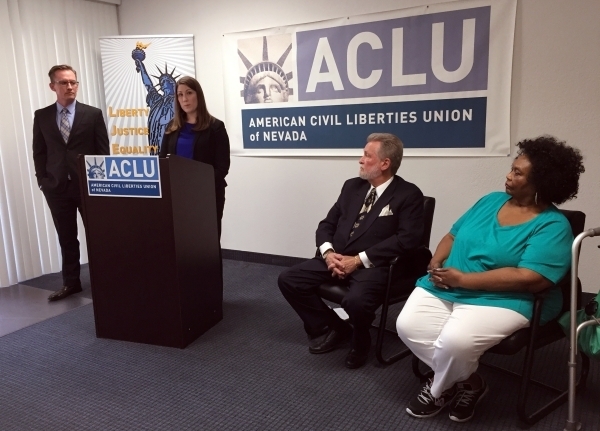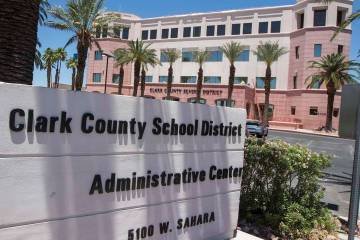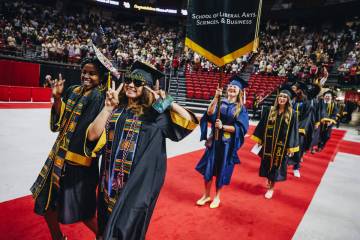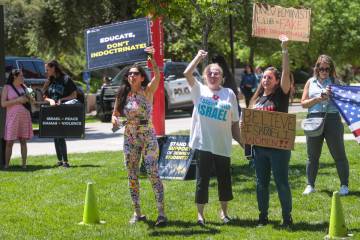Judge may rule soon on lawsuit challenging Nevada education savings accounts
A Las Vegas judge may rule soon on the constitutionality of the state’s new education savings accounts, widely considered to be the most aggressive school choice program in the country.
In Clark County District Court on Thursday, Judge Eric Johnson declined to immediately dismiss a lawsuit challenging the voucher-style program, which goes into effect next month. But Johnson also noted the popularity of the program, indicating he may issue a decision soon.
More than 4,000 families, including that of Henderson mother Aimee Hairr, have applied for early enrollment in the new program that offers parents about $5,000 in state funding to spend on private school tuition and other education services if they pull their students out of public school.
“I definitely think a decision needs to be made soon,” said Hairr, who attended the Thursday hearing.
She hopes to create an education savings account for each of her children, whom Hairr said struggle to succeed in the Clark County School District.
“The longer this takes, the more frustration we feel as parents,” she added. “It yo-yos our children back and forth, so we need an answer.”
In August, the American Civil Liberties Union and its Nevada chapter sued to stop the implementation of Senate Bill 302.
That legislation, which Gov. Brian Sandoval signed in June, allows the creation of education savings accounts for all public and charter school students regardless of income and background. With the first payments set for February, SB 302 allows families to use their account to pay for private school tuition, homeschooling, tutoring, transportation and much more.
The ACLU, however, argues the program violates a provision in the Nevada Constitution that prohibits the state from using public funds of any kind for a sectarian purpose.
Specifically, the civil rights advocacy group claims SB 302 cannot allow taxpayer money to cover tuition at religiously affiliated schools, which make up the vast majority of private schools in Nevada.
“It’s simply not something the (constitution) allows the state to fund,” argued Richard Katskee, legal director of Americans United for the Separation of Church and State, which joined the ACLU in its lawsuit.
Katskee also discounted the state’s claim that SB 302 creates a middleman — namely, parents — who privately decide how to use the money funneled into an education savings account.
Only a parent can choose to spend that money at a religious school, not the government, state Solicitor General Lawrence Van Dyke told Johnson.
Johnson asked Katskee to explain how that private choice differed from public employees spending their government-paid wages for tuition at a religious school or Medicaid recipients who seek treatment at a Catholic hospital.
“If I go to a doctor (who works) for a Catholic hospital to have my gallbladder removed, what I’m paying for is to get my gallbladder removed,” not a sectarian purpose, Katsee said.
The judge interrupted, noting that a non-sectarian medical procedure subsidized with state funds eventually helps the Catholic hospital survive and afford other sectarian purposes. Johnson questioned Katskee's argument that the hospital example differed from a private school using public money on mostly non-sectarian curriculum.
For the state, Van Dyke spent considerable time trying to convince Johnson to dismiss the ACLU’s lawsuit because it had no grounds to sue before the actual implementation of SB 302 next year.
The ACLU, citing another provision in the state constitution, claims the education savings accounts will drain money from public schools and leave them with a higher share of struggling students who cost more to educate.
“If their parade of horrible were to come to pass, they can bring a (complaint),” Van Dyke said.
Johnson also heard arguments from Tim Keller, legal director of the Institute for Justice, which represents a group of parents intervening in the case as defenders of SB 302.
At one point, the judge questioned why the legislation lacked any guidance on how to ensure children actually receive a quality education through the program.
"No offense, but I'm not sure the treasurer is the best person to figure out whether or not educational goals are being met," he said, referring to the state agency in charge of implementing SB 302.
Keller agreed.
"The treasurer is not the best person," he said. "The best person are the parents."
Contact Neal Morton at nmorton@reviewjournal.com or 702-383-0279. Find him on Twitter: @nealtmorton.




























